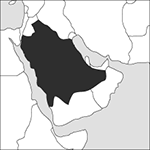
Source: MAPS IN MINUTES™ © RH Publications (1997)
Capital:
Riyadh
Area:
2,149,690 sq km (830,000 sq miles)
Population:
26,939,583 (2013 est)
Currency:
1 Saudi riyal = 100 halalah
Religions:
Sunni Muslim 85.0%; Shia Muslim 10.0%
Ethnic Groups:
Arab 90.0%; Afro-Asian 10.0%
Languages:
Arabic (official)
International Organizations:
UN; Arab League; GCC; OAPEC; OPEC; Non-Aligned Movement; WTO; Colombo Plan
A country in south-west Asia occupying most of the peninsula of Arabia.
Physical
Most of Saudi Arabia is set on a plateau of deserts, which rises to mountains in the south and falls away to a low plain in the east. The ground varies between rock, gravel, and bare sand, and little grows except in the oases and along the Red Sea coast, where slight seasonal rain makes possible the cultivation of dates and a few cereals.
Economy
With one-sixth of the world’s oil reserves, crude oil and oil products contribute around 45% of GDP and nine-tenths of export earnings. Saudi Arabia has the world’s fifth-largest reserves of natural gas, and so far only limited production has begun. The government is attempting to diversify the economy into such areas as power generation, telecommunications, steel, and petrochemicals. The country is well endowed with many other minerals, including gold, iron, copper, and phosphates, which it has yet to exploit. Foreign workers are important to the economy, whereas unemployment is a significant issue among less skilled Saudis.
History
Saudi Arabia was formed from territories assembled by the Saud family, who were followers of Wahhabism, and proclaimed as the kingdom of Saudi Arabia in 1932. The early years of the kingdom were difficult, when revenues fell as a result of the declining Muslim pilgrim trade to Mecca and Medina. An oil concession was awarded to the US firm Standard of California in 1933 and oil was exported in 1938. In 1944 the oil company was re-formed as the Arabian American Oil Company (ARAMCO), and Saudi Arabia was recognized as having the world’s largest reserves of oil. Since the death of Abd al-Aziz ibn Saud (1953) efforts have been made to modernize the administration by the passing of a series of new codes of conduct to conform both with Islamic tradition and 20th-century developments. The Saudi Arabian Minister for Petroleum and Natural Resources, Sheikh Ahmad Yemani, ably led the OPEC in controlling oil prices in the 1970s. King Fahd succeeded to the throne after the death (1982) of his half-brother, Khalid. There were various Saudi initiatives for peace in the Middle East in the 1980s, and that of 1989 finally resolved the crisis in Lebanon by the Taif Accord. In 1990 the UN sent troops to protect Saudi oil fields from Iraqi invasion. The Gulf War which followed had de-stabilizing social effects, with pro-democracy liberals and Islamic fundamentalists voicing criticism of the regime of King Fahd. In 1992 King Fahd announced the creation, by royal decree, of a Consultative Council, comprising 60 members chosen by the King every four years. The council, inaugurated in 1993, was to have an advisory and not a legislative function, as the King expressed his view that democracy was not suited to the Gulf region. However, municipal elections were held in 2005. King Fahd also denounced the spread of Islamic fundamentalism. International concern has been raised over the abuse of human rights and the number of public executions in Saudi Arabia. Fahd was succeeded by Crown Prince Abdullah in 2005. His reign saw limited political and economic reform while maintaining a firm stance on security. In 2011 he announced that women would be able to stand as candidates and vote in the 2015 council elections council elections. In 2014, dissent was further controlled by new anti-terrorism laws and the banning of organizations such as the Muslim Brotherhood. Later that year, Saudi Arabia joined the US bombing raids on so-called Islamic State in Syria, and from 2015, it intervened against Houthi rebels in neighbouring Yemen, thereby exacerbating a devastating civil war. Abdullah died in 2015 and was succeeded by his half-brother, Salman. In the mid-2010sdecliining oil prices led to an increase in the national debt, and, in order to raise funds, the government made plans to sell shares in Saudi Aramco, the national oil company (2017-18). King Salman issued a decree in Sept 2017 – implemented in June 2018 - allowing women to drive.
- cognitive pluralism
- cognitive psychotherapy
- cognitive radio
- cognitive science
- cognitivism
- cogwheel ore
- Cohen, Hermann (1842–1918)
- Cohen, Jacob (1923–98)
- Cohen, Paul Joseph
- Cohen, Seymour Stanley
- Cohen's kappa
- Cohen, Stanley
- Cohen-Tannoudji, Claude
- coherence
- coherence bandwidth
- coherence length
- coherence theory of truth
- coherent anti-Stokes Raman spectroscopy
- coherent detection
- coherentism
- coherent radiation
- coherent scattering
- coherent state
- coherent units
- cohesin